What could that potentially look like?
Chemicals: A new venture might explore a circular economy business model, in which a client only pays for the amount of material in circulation at any point in time. The incentives would radically shift to reclaiming and repurposing the material in circulation as often as possible while drastically increasing the margins of the business as critical processes required can be moved to the customer’s facilities and everything in circulation is provided as a service, rather than traditional material sales — including performance guarantees of the material for the purpose it serves.
Whitegoods: A new venture could offer bulky, high-CapEx white goods, such as air conditioners, washing machines, or refrigerators, as a service rather than for direct purchase. The service stack would include remote condition monitoring, predictive and preventive servicing, and the ability to up or down-grade as required. The industrial design of units would shift to a modular stack, which allows for straightforward repairs to extend the lifetime and easy reuse of individual parts at the end of a machine’s lifecycle into the following lifecycle.
Agriculture: A new venture might explore the option for consumers to buy into a harvest before it happens fractionally, distributing risk globally and decentralizing the risk finance for smallholder farmers. In return, they can directly (D2C) receive the fresh produce the harvest has yielded, increasing earnings for farmers, or trade on the proceeds of their investment.
There are many ways in which the current systems could be reinvented, with a view on sustainability and impact. Triple Top Line organizations decouple economic growth from resource usage and consumption to find new paradigms that can be sustained through replenishing cycles common in the natural world. However, it is clear that transforming the current core right away into any of these directions is very risky and a move only few can afford.
Therefore, a corporate venture approach can introduce much-needed optionality and the ability to explore many potential futures with small, incremental bets while not betting the house.
Interested to learn more about sustainability ventures? Drop us a line: contact@wright.partners
Authors:
Sebastian Mueller, Co-Founder at MING Labs
Ziv Ragowsky, Founding Partner at Wright Partners
Mayur Singh, Venture Partner at Wright Partners

